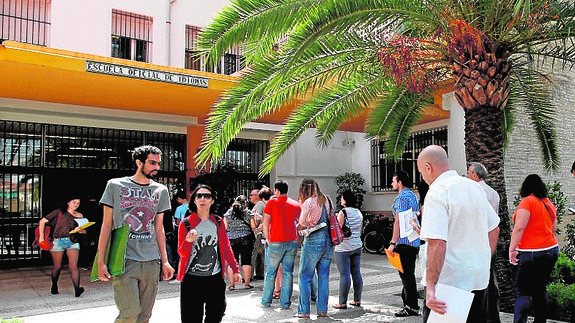 Yup, it's official. I'm officially a student at the slightly officiously-named Escuela Oficial de Idiomas (the Official School of Languages) in Málaga. And I think the teacher just might be officially a maverick. He certainly has the most unique teaching style I have ever come across. It's going to be great!
Yup, it's official. I'm officially a student at the slightly officiously-named Escuela Oficial de Idiomas (the Official School of Languages) in Málaga. And I think the teacher just might be officially a maverick. He certainly has the most unique teaching style I have ever come across. It's going to be great!
From the opening class, it appears that the Language Points in these blog posts are likely to change in their nature. We'll see. But I suspect there will be fewer grammatical points and more .... umm ... well more about communication!
I received two official communications on the same day last week. One was a multa, a traffic fine. Speeding (just a little bit). 50€ payable at any branch of Santander. Done. Checking the date, it was either on the way or coming back from an intercambio coffee with Jose. Ah well. The four-month course at the Official School is only 70€ so mentally I will add the fine to that (and it is STILL a cheap course, even with the added multa!).
 The other was my exam results from last November. I am officially chuffed. I was classified as "Apto" which is the official "pass" category. I needed 60% in all sections to pass. I am officially delighted to have received an overall pass of 86%. It was the listening exercise and the prepositions that dragged it down - I got 91% in the writing exercises, and ..... drum roll please! ..... 100% in the oral communication and interaction part!!! Unbelievable! I am officially flabbergasted.
The other was my exam results from last November. I am officially chuffed. I was classified as "Apto" which is the official "pass" category. I needed 60% in all sections to pass. I am officially delighted to have received an overall pass of 86%. It was the listening exercise and the prepositions that dragged it down - I got 91% in the writing exercises, and ..... drum roll please! ..... 100% in the oral communication and interaction part!!! Unbelievable! I am officially flabbergasted.
Fernando of course brought me back down with a bump in his opening speech of our new course. He pooh-poohed exam results (while admitting that many need them for work or university), and promised us that after his B2 course we would have a deep understanding of communication in Spanish, regardless of exam results.
The A1, A2, B1, B2, C1 & C2 international system has been in place for 14 years now, rolling out first across Europe and more recently adopted in Australia and the USA. I don't know how the levels are described officially by the  academic infrastructure that monitors them, but I doubt they use Fernando's descriptions. "A1 means you can tell someone your name" he said, waving a hand dismissively. "At A2 you can manage in shops and restaurants. B1 is about subsistence in a country - you won't die, because you can ask the way to places and get out of difficulties." The upper levels are where it gets more interesting, he said. "B2 is about beginning to communicate with people in Spanish the way you would in your own language." With light and shade, with jokes, with nuances and with subtleties. "C1 is about dominating the language, the culture and the literature, and at C2 it is about perfect fluency."
academic infrastructure that monitors them, but I doubt they use Fernando's descriptions. "A1 means you can tell someone your name" he said, waving a hand dismissively. "At A2 you can manage in shops and restaurants. B1 is about subsistence in a country - you won't die, because you can ask the way to places and get out of difficulties." The upper levels are where it gets more interesting, he said. "B2 is about beginning to communicate with people in Spanish the way you would in your own language." With light and shade, with jokes, with nuances and with subtleties. "C1 is about dominating the language, the culture and the literature, and at C2 it is about perfect fluency."
Sounds good. This should be fun! And that's official.
© Tamara Essex 2015 http://www.twocampos.com
THIS WEEK'S LANGUAGE POINT:

I came across a sentence in a novel I'm reading by Julia Navarro. It's a fascinating book about a young unemployed journalist asked by his aunt to research his great-grandmother (who was never spoken about in their family). It is going to go back through most of the last century, giving interesting background into life during the Spanish Civil War and afterwards.
Anyway, this sentence struck me as being particularly interesting in its use of tenses. The scene is the morning of an important dinner party .....

"On Saturday, doña Teresa appeared nervous. She wanted everything to go well, and she, always so affable, became impatient if something wasn't quite as she wanted."
I noticed in particular the subjunctive in the second sentence ("She wanted that everything were to be perfect...") and also the reflexive verb to become impatient or to make oneself impatient. I found myself reading it over and over again, trying to internalise the constructions. Now I just need to find someone who is preparing a dinner party so I can insert these phrases "casually" into the conversation!